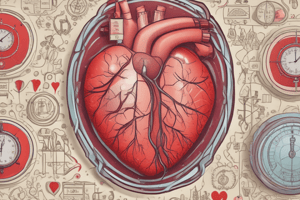Podcast
Questions and Answers
What is the minimum systolic blood pressure that defines hypertension?
What is the minimum systolic blood pressure that defines hypertension?
- 130 mm Hg
- 140 mm Hg (correct)
- 120 mm Hg
- 150 mm Hg
Which type of hypertension accounts for 95% of cases and has no specific identifiable cause?
Which type of hypertension accounts for 95% of cases and has no specific identifiable cause?
- Secondary Hypertension
- Primary Hypertension (correct)
- Renal Hypertension
- Malignant Hypertension
Which of the following conditions is a known cause of secondary hypertension?
Which of the following conditions is a known cause of secondary hypertension?
- Chronic Stress
- Kidney Disease (correct)
- Obesity
- Hypertension Induced by Caffeine
Which mechanism is a notable contributor to the pathophysiology of hypertension?
Which mechanism is a notable contributor to the pathophysiology of hypertension?
What is a major clinical manifestation of severe hypertension when target organ damage occurs?
What is a major clinical manifestation of severe hypertension when target organ damage occurs?
Which test is typically used to assess for kidney damage in patients with high blood pressure?
Which test is typically used to assess for kidney damage in patients with high blood pressure?
What role does the renin-angiotensin-aldosterone system (RAAS) play in hypertension?
What role does the renin-angiotensin-aldosterone system (RAAS) play in hypertension?
Which of the following is NOT commonly associated with target organ damage from hypertension?
Which of the following is NOT commonly associated with target organ damage from hypertension?
How long apart should blood pressure measurements be taken to accurately diagnose hypertension?
How long apart should blood pressure measurements be taken to accurately diagnose hypertension?
What is an aspect of insulin resistance related to hypertension?
What is an aspect of insulin resistance related to hypertension?
What is the primary purpose of echocardiography in patients with hypertension?
What is the primary purpose of echocardiography in patients with hypertension?
Which of the following is NOT a common risk factor for hypertension?
Which of the following is NOT a common risk factor for hypertension?
What is the treatment goal for blood pressure in adults under 60 years old?
What is the treatment goal for blood pressure in adults under 60 years old?
Which dietary approach is recommended for managing hypertension?
Which dietary approach is recommended for managing hypertension?
What class of medication works by blocking the conversion of angiotensin I to angiotensin II?
What class of medication works by blocking the conversion of angiotensin I to angiotensin II?
Which of the following nursing diagnoses is commonly associated with hypertension management?
Which of the following nursing diagnoses is commonly associated with hypertension management?
What defines a hypertensive emergency?
What defines a hypertensive emergency?
What is the desired reduction in blood pressure during the first hour of treatment for hypertensive emergencies?
What is the desired reduction in blood pressure during the first hour of treatment for hypertensive emergencies?
Which intervention is most important for promoting adherence to treatment in hypertensive patients?
Which intervention is most important for promoting adherence to treatment in hypertensive patients?
What is a recommended lifestyle change to help manage hypertension?
What is a recommended lifestyle change to help manage hypertension?
Flashcards are hidden until you start studying
Study Notes
Hypertension Definition
- Hypertension is defined as a systolic blood pressure (SBP) of 140 mm Hg or higher or a diastolic blood pressure (DBP) of 90 mm Hg or higher based on two or more accurate BP measurements taken 1 to 4 weeks apart.
Types of Hypertension
- Primary hypertension accounts for 95% of hypertension cases and has no identifiable cause.
- Secondary hypertension accounts for 5% of hypertension cases and is caused by underlying conditions like kidney disease, renal artery stenosis, hyperaldosteronism, certain medications, or pregnancy.
Pathophysiology
- Key mechanisms involved in hypertension include increased sympathetic nervous system activity, increased renal sodium, chloride, and water reabsorption, increased renin–angiotensin–aldosterone system (RAAS) activity, decreased vasodilation of arterioles, insulin resistance, and immune system activation leading to renal inflammation.
Clinical Manifestations
- Hypertension is often asymptomatic, known as the "silent killer".
- In severe cases, hypertension can lead to target organ damage, causing symptoms like eye damage, renal damage, heart disease, stroke, and peripheral arterial disease.
Assessment and Diagnostic Findings
- History and physical exams focus on potential target organ damage.
- Laboratory tests include urinalysis to check for kidney damage, blood chemistry to monitor sodium, potassium, creatinine, fasting glucose, and cholesterol levels, 12-lead ECG to detect heart problems, and echocardiography to assess left ventricular hypertrophy.
Risk Factors for Hypertension
- Common risk factors for hypertension include age, family history, high salt intake, obesity, lack of exercise, smoking, excess alcohol consumption, and stress.
Medical Management
- The goal of hypertension treatment is to lower BP below 140/90 mm Hg in most adults, or below 150/90 mm Hg in adults over 60-80 years old.
Lifestyle Modifications
- Dietary changes include adopting the DASH diet, which is rich in fruits, vegetables, and low-fat dairy, and reducing sodium intake.
- Increasing physical activity, quitting smoking, and limiting alcohol consumption are also recommended.
Pharmacologic Therapy
- Medications used to manage hypertension include diuretics, beta-blockers, ACE inhibitors, calcium channel blockers, and angiotensin II receptor blockers (ARBs).
Nursing Process
- Common nursing diagnoses for patients with hypertension include knowledge deficit and noncompliance.
- Nursing interventions include increasing the patient's knowledge about the disease, treatment, and lifestyle changes, promoting adherence to medications and lifestyle changes, and monitoring for complications.
Hypertensive Crises
- Hypertensive emergency occurs when BP is greater than 180/120 mm Hg with target organ damage, requiring immediate treatment to lower BP by 20-25% within the first hour, with a goal of 160/100 mm Hg over 6 hours.
- Hypertensive urgency involves high BP but no evidence of organ damage, requiring normalization of BP within 24-48 hours.
Studying That Suits You
Use AI to generate personalized quizzes and flashcards to suit your learning preferences.




